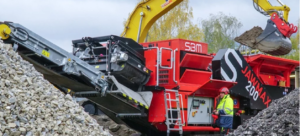
Whether you are an excavating or demolition contractor, or even currently operate and accept recyclable material, you should consider these factors.
Cost
As with any business venture or operation, the dollars and cents must make sense.
If you have, or can get, a steady supply of recyclable material, either from your own jobs or by opening a recycling depot, you have the ability to produce salable reusable material either for your own use or for sale to third parties.
If you can crush and produce a usable product, the value of this product replaces the cost of virgin material that would have had to be used in its place. This should be factored as a savings on material purchases as a whole, for without recycling, virgin material would always need to be purchased.
Cost factors include the cost of crushing, transport and handling of material, ownership and operating costs of the crusher.
Revenue potential includes the crushing operation itself, intake fees for recyclables, and sale revenue as they ship back out.
There are many advantages to recycling asphalt and concrete—environmental issues, cost savings, and potential material sale are all reasons to consider crushing. But does it make sense for your business size and model?
Environmental and Project Considerations
There are a number of environmental benefits to crushing:
- Provide a service not considered before for the job at hand.
- Recycling allows material to be reused on site where possible.
- Conserve the use of virgin natural resources through replacement with recyclable products.
- When the opportunity exists to recycle on site for yourself or an owner, crushing eliminates the haulage to another site and associated issues.
- Proper crushing and fractionation of asphalt allows for higher recycled AC (Asphalt Cement Recovery) content and better manufacturing control allowing for reduced need for addition of asphalt cement.
Revenue Potential
With an average cost of recycled concrete and asphalt in Ontario at $10 per ton, and with a compact mobile crusher that could process up to 200 tonnes per hour, you have potential revenue of $2,000 worth of product each hour. You also help with the Carbon Footprint by reducing the hauling of virgin material.
Recycled Asphalt Pavement (RAP)
Asphalt is another material to consider recycling. When compacted, the material hardens and binds together, making it a great choice for use on driveways, parking lots, and roads. RAP is becoming a popular material due to growing environmental concerns as well as its low cost and excellent bonding qualities. Fractionating your RAP with a specialty screen like a High Frequency PTSC Plant can help you increase the yields of usable Asphalt Cement.
Investing in Crushing Equipment
Once you’ve determined that crushing is a viable opportunity, you’ll need to investigate what equipment is right for your needs, and whether ownership, renting, contracting out is the route to go. With recycled aggregate growing in availability, now is the perfect time to consider crushing.
Amaco is Ontario’s heavy equipment specialist and has helped municipalities, contractors, and owner-operators across the province find the right machine solutions for them. Contact us today to discuss your needs!
- A Guide to Choosing the Right Heavy Equipment Solutions
- Avoid Surprises in Your Municipal Heavy Equipment Budgets Next Year (3 Essential Tips You Need to Know)
- Maximize Road Life and Durability: Selecting the Best Asphalt Maintenance Equipment - April 22, 2024
- Catch Up with Amaco at the Ontario Good Roads Association Conference! - April 17, 2024
- Don’t Miss Amaco at the National Heavy Equipment Show - March 20, 2024











